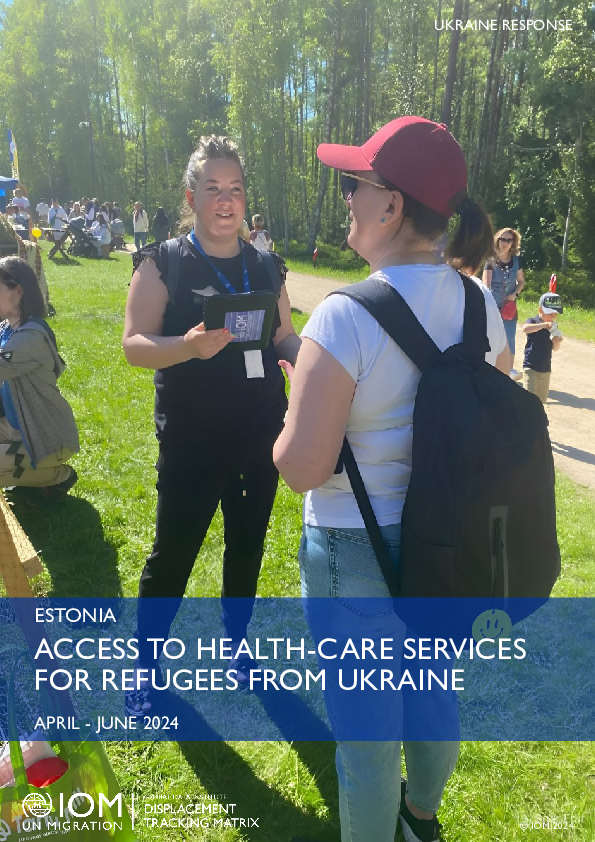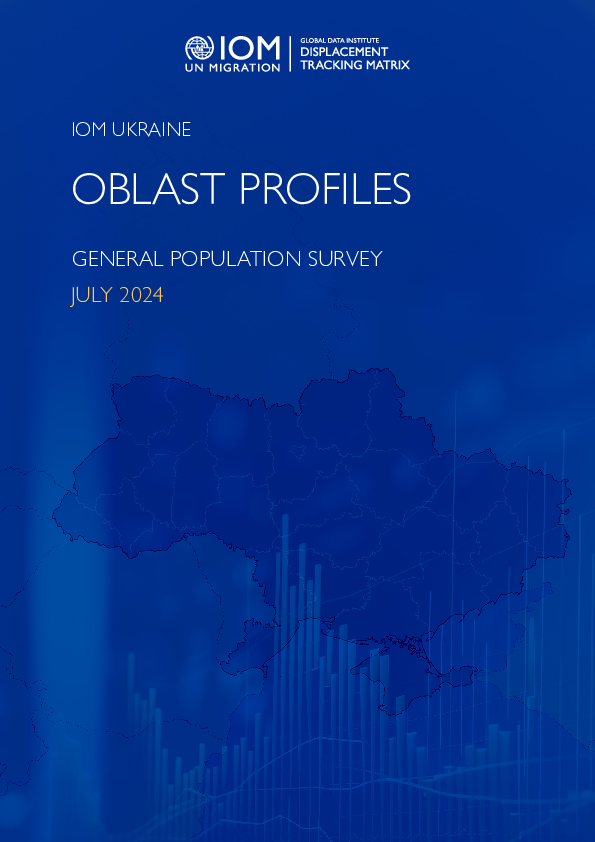-
Countries
-
Data and Analysis
-
Special Focus
-
Crisis Responses
Assessment Report

Contact
DTM Europe, DTMMediterranean@iom.int
Language
English
Location
Estonia
Period Covered
Apr 01 2024
Jun 30 2024
Activity
- Survey
The IOM’s Displacement Tracking Matrix (DTM) collected data through Surveys with refugees in the Ukraine Response region from April to June 2024, conducting interviews with a total of 654 individuals in Estonia. This report explores different aspects of health care integration, focusing on the profiles of adult respondents, specifically those who intend to stay or have already established themselves in the country. The report focuses on their access to health care services and elaborates on their experiences and needs regarding health care during their displacement.
Key findings:
- 88% of those who reported experiencing health-related issues (30% of all respondents) have or live with people with chronic diseases or serious medical conditions, while 45% reported living with a person with visual impairment and 27% have or are with someone with mobility issues.
- Health related needs reported by the respondents include health care services (22%), mental and psychosocial support (6%), and medication (5%).
- 80% of respondents were registered with a General Practitioner (GP), 19% were not, and 1% were unsure.
- Reasons for not being registered included being refused by a doctor (42%), having no need (19%) and long waiting times (13%).
- 84% of children were registered with a doctor.
- The most reported barriers to accessing health care were long queues (45%), language barrier (13%), costs (7%), and unavailable services (3%).
- Only 17% of respondents used mental health support services.

Contact
DTM Libya, DTMLibya@iom.int
Language
English
Location
Libya
Snapshot Date
Jun 30 2024
Activity
- Survey
- Flow Monitoring Survey
This document showcases the profile of construction migrant workers in Libya surveyed by DTM Libya in 2023. This profile highlights the main sociodemographic characteristics of migrant construction workers in Libya and their labour market conditions, such as the type of contract they hold and the main risks they face at work.

Contact
DTM Libya, DTMLibya@iom.int
Language
English
Location
Libya
Snapshot Date
Jun 30 2024
Activity
- Survey
- Flow Monitoring Survey
- Flow Monitoring
This document showcases the profile of agricultural migrant workers in Libya surveyed by DTM Libya in 2023. This profile highlights the main sociodemographic characteristics of migrant agricultural workers in Libya and their labour market conditions, such as the type of contract they hold and the main risks they face at work.

Contact
DTM Sudan, DTMSudan@iom.int
Language
English
Location
Sudan
Period Covered
Apr 01 2024
Jun 30 2024
Activity
- Mobility Tracking
- Baseline Assessment
Since 01 April 2024, DTM monitored numerous clashes across Al Fasher and other localities in North Darfur state that triggered widespread displacement.
Reported clashes displaced an estimated 328,981 individuals (65,933 households) between 01 April 2024 and 30 June 2024.
The Focused Flash Alert provides a numeric breakdown of displacement due the recent escalations from 01 April -30 June 2024. All figures should be understood as preliminary estimates, pending further verification. For more information, see Focused Flash Alert North Darfur (Update 002) and (Update 001).
DTM Sudan releases Early Warning Flash Alerts to provide immediate updates on specific incidents or armed clashes that spurred displacement. Early Warning Flash Alerts are distributed via the DTM Sudan mailing list. For more granular information on displacement and mobility, see Sudan Mobility Update (03).

Contact
DTM Somalia, IOMSomaliaDTM@iom.int
Language
English
Location
Somalia
Period Covered
Feb 01 2024
Mar 31 2024
Activity
- Mobility Tracking
- Baseline Assessment
Baseline 2, an area-based assessment, is the second step of Mobility Tracking implemented at settlement level and aims to quantify presence of population categories. For round 3, DTM Somalia is administered across 7 regions and 29 districts in three states namely Hirshabelle, Jubaland, South-West State from February to March 2024.

Contact
DTMLibya@iom.int
Language
English
Location
Libya
Period Covered
Jan 01 2023
Dec 31 2023
Activity
- Survey
Following the release of the first edition of PROGRESS 2023 report, the Displacement Tracking Matrix (DTM) has compiled a series of National Displacement Profiles based on end of year 2023 figures. These profiles offer insights into the latest end-of-year 2023 figures, aligning with the objectives outlined by the Data for Solutions to Internal Displacement Taskforce (DSID).
The profile provides a comprehensive overview of the demographic breakdowns and geographical distribution of internally displaced persons (IDPs) in Libya in 2023. It delves into the primary areas of origin and displacement for IDPs, shedding light on the factors influencing their decision-making processes regarding the selection of solutions locations. Additionally, the report discusses the obstacles encountered by IDPs in their pursuit of durable solutions.
This compilation underscores the critical role of data in addressing internal displacement challenges and highlights the ongoing efforts to leverage data-driven solutions through collaborative initiatives like DSID.

Contact
DTMRCA@iom.int
Language
French
Location
Central African Republic
Period Covered
Aug 01 2023
Aug 15 2023
Activity
- Survey
Suite à la publication de la première édition du rapport PROGRESS 2023, la Matrice de suivi de déplacement (Displacement Tracking Matrix, en anglais (DTM)) de l'Organisation Internationale pour les Migrations (OIM) a compilé une série de profils nationaux de déplacement basés sur les chiffres de la fin de l'année 2023. Ces profils offrent un aperçu des derniers chiffres de la fin de l'année 2023, s'alignant sur les objectifs définis par la task-force "Données pour des solutions au déplacement interne" (DSDI), (Data for Solutions to Internal Displacement Taskforce, en anglais (DSID).
Le profil fournit une vue d'ensemble des répartitions démographiques et géographiques des personnes déplacées de la République Centrafricaine à la fin de l'année 2023. Il se penche sur les principales zones d'origine et de déplacement des personnes déplacées, en mettant en exergue les facteurs qui influencent leur processus de prise de décision concernant la sélection des lieux de solution. En outre, le rapport examine les obstacles rencontrés par les personnes déplacées dans leur recherche de solutions durables.
Cette compilation souligne le rôle essentiel des données dans la résolution des problèmes de déplacement interne et met en lumière les efforts en cours pour tirer parti de solutions fondées sur des données grâce à des initiatives de collaboration telles que la DSDI (en anglais DSID).

Contact
DTMUkraine@iom.int
Language
English
Location
Ukraine
Period Covered
Mar 10 2024
Apr 11 2024
Activity
- Survey
The Oblast Profiles draw from data collected during Round 16 of IOM Ukraine’s General Population Survey (GPS), with an emphasis on demographics & displacement, the adoption of coping strategies to meet needs, employment & income, and housing. These granular insights, categorized by population group at the oblast level, aim to inform strategic, programmatic, and operational decision-making.

Contact
DTMRCA@iom.int
Language
French
Location
Central African Republic
Period Covered
Jan 01 2023
Dec 31 2023
Activity
- Survey
Following the release of the first edition of PROGRESS 2023 report, the Displacement Tracking Matrix (DTM) has compiled a series of National Displacement Profiles based on end of year 2023 figures. These profiles offer insights into the latest end-of-year 2023 figures, aligning with the objectives outlined by the Data for Solutions to Internal Displacement Taskforce (DSID).
The profile provides a comprehensive overview of the demographic breakdowns and geographical distribution of internally displaced persons (IDPs) in the Central African Republic as of the end of 2023. It delves into the primary areas of origin and displacement for IDPs, shedding light on the factors influencing their decision-making processes regarding the selection of solutions locations. Additionally, the report discusses the obstacles encountered by IDPs in their pursuit of durable solutions.
This compilation underscores the critical role of data in addressing internal displacement challenges and highlights the ongoing efforts to leverage data-driven solutions through collaborative initiatives like DSID.

Contact
DTMRCA@iom.int
Language
French
Location
Central African Republic
Period Covered
Aug 01 2023
Aug 15 2023
Activity
- Other
- Survey
Following the release of the first edition of PROGRESS 2023 report, the Displacement Tracking Matrix (DTM) carried out focus group discussions to understand the nuances of the effects of displacement from the perspectives of individuals who were displaced, had returned or were part of communities which hosted IDPs. The focus group discussions served as a forum to share viewpoints that are not often captured by traditional data collection exercises, including affected communities' perceptions of cultural and gendered effects of displacement in their communities. The discussions were conducted in local languages and translated by IOM DTM staff.
This report presents a deeper country-specific dive into the findings of the qualitative analysis of six focus group discussions conducted between 1 and 15 August 2023 in Kaga-Bandoro, with 69 representatives of IDPs, host community, and returnees. Half of the respondents were female. Some 72 per cent of respondents were between the age of 18 and 59, and the remaining 28 per cent was equally distributed between those under the age of 17 and those older than 60 years.
Pagination
- Previous page
- Page 22
- Next page
